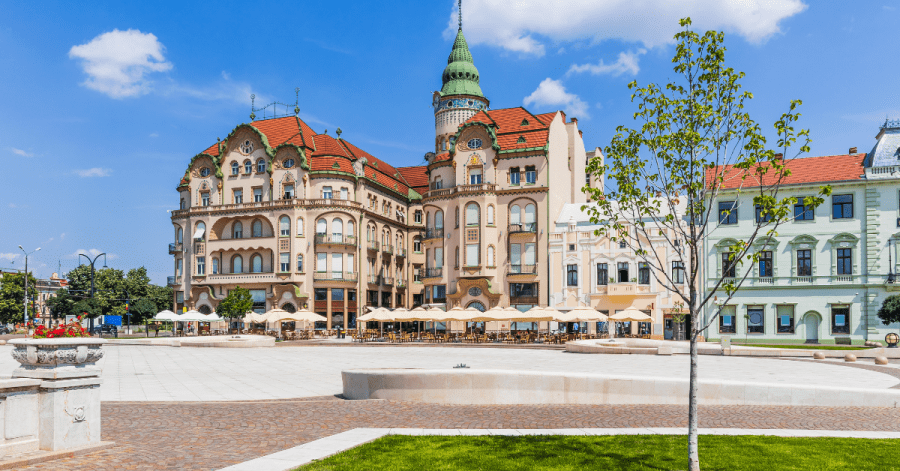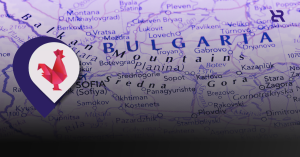In the North-West of Romania, part of the Bihor county, Oradea is one of the cities with an impressive development on multiple fronts in recent years. The municipality and business incubators made technology and innovation integral to the future of the city, leading to an ecosystem of 22 startups, which employs around 340 people. Since 2008, Oradea has also been considered a center of urban development, with regional and cross-border influence.
Oradea was a great contender for The Recursive’s SEE Cities in the Spotlight series, where we explore the dynamics and key success factors behind the urban and innovation centers in Southeast Europe.
In this analysis, you will read about:
- What projects and investments have contributed to Oradea’s development;
- What resources are locally available for companies, startups, and tech talent;
- The case of the private-public partnership Make IT in Oradea: How other cities can derive inspiration from Oradea’s approach to support the tech ecosystem.
How Oradea has developed in recent years
Social, economic, and cultural landscape
The vision for the development of the region in which Oradea is situated is best elaborated in the “Plan for the Development of the North-Western Region 2021-2027” by the North-West Regional Development Agency (RDA). According to the plan, until 2034 the region will be in top innovative regions in Central and Eastern Europe.
To that end, five strategic objectives have been proposed in the Regional Operational Plan, the most important sources for European funds in the region: increasing the economy’s competitiveness based on innovation and digitalization, improving education, using natural resources sustainably, developing multimodal urban mobility, and creating smart cities.
Oradea is showing great potential in driving the region’s development, as an urban center, as well as through investments in infrastructure, development of tech hubs, and resources for the private sector, with particular involvement from the local government.
Local governance, particularly, has been actively involved in the transformation of Oradea, mainly by accessing and deploying European funds. Between 2007-2016, Oradea had the highest absorption of European funds among Romanian cities, around €140 million, and invested a total of €240 million (€1.225 per capita). Between 2014-2020, Oradea further contracted European funds of €284 million, twice more than in the previous period.
The funds have been channeled towards road infrastructure, the rehabilitation of buildings, developing green spaces and expanding pedestrian spaces, and industrial park development, among others.
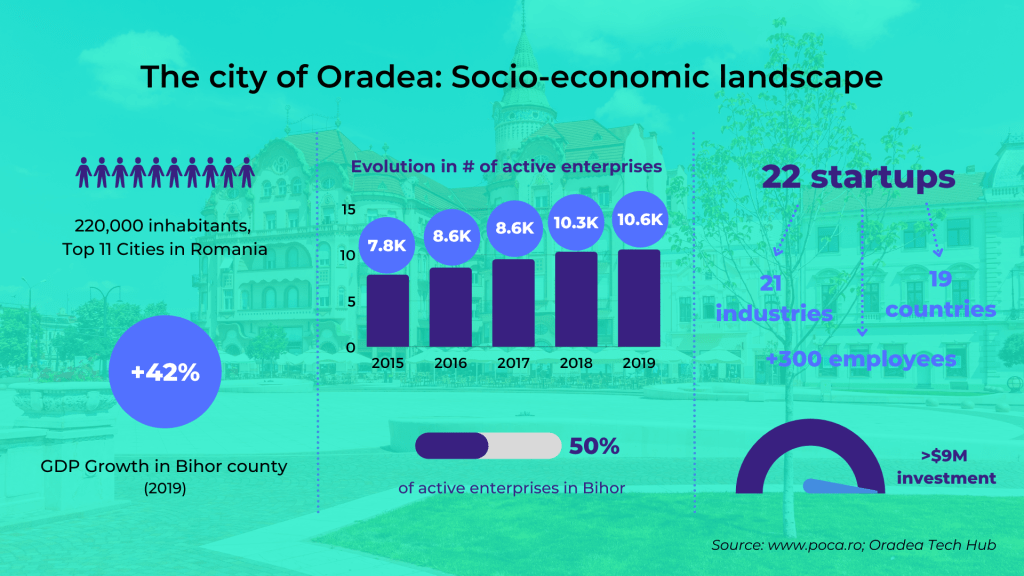
In recent years, Oradea has climbed its way up in the top 11 cities in Romania by population, counting approximately 220,000 inhabitants in 2020. In the metropolitan area, the population grew by 1.78% since 2014, mainly due to urban migration. The majority of the population (~70%) is in the 15-64 age group. The Metropolitan Area of Oradea accounts for almost half of the total population in Bihor county.
Bihor has also enjoyed continuous economic development in recent years. In 2018, it was in the top 11 counties by contributions brought to the national GDP. Between 2014-2018, the regional GDP has grown even faster than the national average, with 43.25%. The number of active enterprises has also increased substantially in 2019 (~50%) .
The city of Oradea is an economic hub in the region, concentrating the majority (~80%) of all active enterprises in the metropolitan area of Oradea and around half of all active enterprises in Bihor. In 2020, small enterprises made up the largest number of companies in the city of Oradea (11,802), predominantly active in the services and commerce sectors (9,664), and with a €1.54 billion revenue figure.
Furthermore, between 2017-2020, 1,248 enterprises had foreign capital from countries such as Hungary, Italy, Germany, Austria, and Slovakia.
The city’s startup and technology scene is also active. The Oradea Tech Hub was set up in 2015 to develop a local tech ecosystem hub.
In 2020, The Oradea Tech hub mapped the local startup ecosystem for the first time and found:
- 22 startups operating in 21 industries and 19 countries;
- +336 people employed by startups in Oradea;
- +11 million users;
- +$9 million invested in local startups.
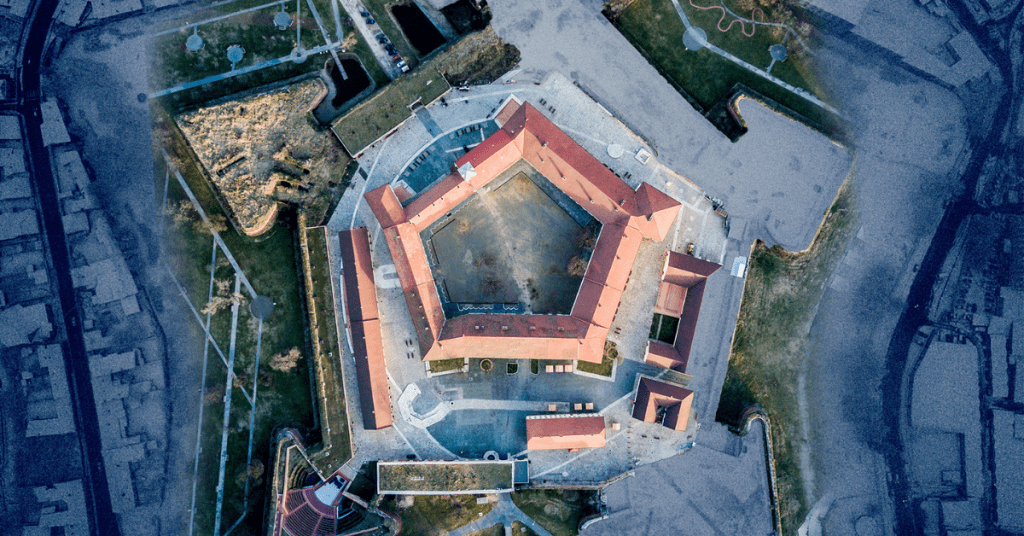
One key economic sector for the city is tourism. Between 2014-2019, before the pandemic hit, the sector recorded significant growth: ~84% in reviews, ~58% in the number of active enterprises, and ~32% in the number of employees. Furthermore, being located at a close distance from European urban centers represents a key advantage for the city in developing transit- and business-aimed tourism.
The wider metropolitan area of Oradea has a rich cultural heritage. Historic places include the Oradea Fortress, the foundation of the current city of Oradea, and the Tower of Cheresig, the oldest and best-preserved medieval Romanesque keep in the west of the country.
Furthermore, the architecture of the city is diverse and impressive. Oradea has several palaces in art nouveau (secession), baroque, and eclectic styles. Art nouveau had a big influence on the city’s facade and is particularly visible in the floral decorations of buildings, such as the Black Eagle Palace.
Oradea and its surroundings also enjoy the presence of thermal natural springs, giving rise to balneary tourism.
Towards a smart city
When it comes to infrastructure, a lot of recent investments in recent years have been channeled towards public services, road infrastructure, and energy resources exploitation.
In the past years, increases in the housing stock, the average living area, and the available green space per capita have contributed to a better living standard.
The city has taken concrete action to increase pollution and climate change effects from greenhouse gas emissions, including through the rehabilitation and thermal modernization of old buildings. One example is the transition of various buildings and entire areas to geothermal energy, such as the Polyvalent Hall, the Oradea County Hospital, and the Nufarul 1 neighborhood.
By 2023, the municipality wants to increase the share of geothermal energy in the heating mix to 14% from 5% in 2021, which will help the city decrease dependency on natural gas.
Geothermal waters are a rich source of renewable energy in the area, not fully exploited thus far. Considering its location in the Western Plain and the influence of the oceanic climate from the west, the city also has a good solar energy potential.
Oradea is also a transportation hub, including road transport, railway, and airline, with important networks for both national and international transit due to its strategic location in the west of the country. The Oradea-Cluj-Napoca section of the highway is planned to be finalized by 2024. This will be connected to Hungary, ensuring a connection all the way to Vienna.
In 2021, Oradea was on the eight place (tied with Timisoara) in the ranking of smart cities in Romania (Ed. note according to the Smart City concept developed by the European Commission, with 26 projects in the following categories: smart living (10), smart mobility (9), smart governance (5), smart environment (1), and smart economy (1). Some of these projects include:
- Smart mobility: SMS parking, SMS public transportation payment, online parking payment, e-ticketing,
- Smart economy: Oradea city app with info for tourists
- Smart environment: smart LED street lightning
- Smart living: Oradea City Report app for citizens to report issues, MobilePay app for fiscal obligations
- Smart governance: computer system for GPS monitoring of public sanitation service activity, geographic information system (GIS)
How Oradea supports companies and startups
These developments have contributed to building the local workforce and business ecosystem. In the past, students or young professionals used to leave for other bigger cities in the region. But now people are either staying in Oradea after high school graduation or are coming back after graduating university elsewhere due to work opportunities.
Oradea is the second education center in the north-west region in terms of the number of universities and the number of the population in schools, after Cluj-Napoca.
The University of Oradea is one of the most important university centers in the western part of the country. It has 15 faculties and relationships with 352 universities from 39 countries, through academic exchanges and scientific research cooperation. Its research departments obtained results in fields such as IT, space and security, energy, eco-nanotechnologies and climate change.
There are additional institutions carrying out research activities in Oradea, including
The National Institute for Research and Development in Forestry, NetIQ, specialized in IT research, and Termoline, with research in renewable energy.
In 2008, the Local Development Agency in Oradea (ADLO) together with the Oradea City Hall, started building the city’s industrial parks. The city of Oradea currently has four industrial parks employing more than 8,500 people in 2021. The 104 companies which had invested at the time contributed to a total pool of €410 million.
Another important project for ADLO is the launch of the city’s first science and technology park to create an innovation and technology transfer infrastructure in Bihor. The technology park will pool an investment of €7 million and will be built in partnership with the Bihor County Council, the University of Oradea and the Bihor Science and Technology Park Society, on an area of ~5.200 square meters near the University of Oradea.
In recent years, the private sector has received further support through the emergence of business and startup incubators, developed with support from the local government.
In 2020, the emerging tech ecosystem welcomed the first support program of its kind in the city, an incubator with funding opportunities for tech startups. The Bright Labs Incubator is organized by Make IT in Oradea, the aforementioned non-profit organization, founded through a collaboration between the private sector and the municipality.
“Cresc Oradea Mare” is another business incubator, currently in development, which aims to support young companies in the creative sector with launching new products and services. The project includes the rehabilitation of the former Neurology Hospital where the incubator’s activity will take place. The building will host 20 offices for startups, 30 open-space workspaces, 6 workshop and support spaces for incubator participants, and event and training rooms. €3.6 million is allocated for the project.
Case study: Make IT in Oradea as a private-public partnership
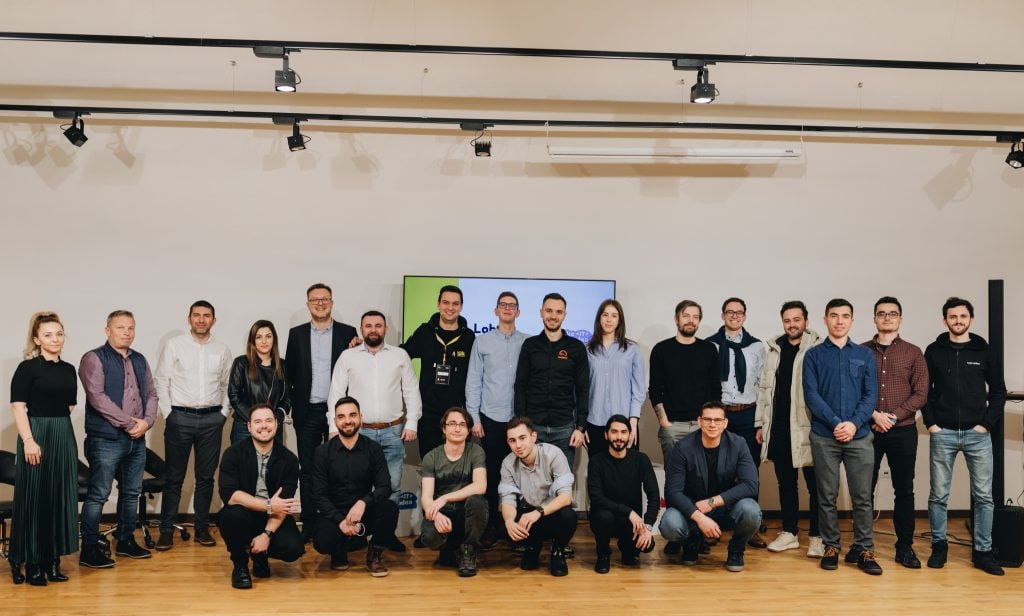
In Oradea, the first real signs and discussion around IT companies and startups started between 2000-2005. More and more local entrepreneurs emerged, jumping into the tech startup with fresh ideas, developing products and selling them globally.
This momentum motivated a few companies in Oradea to approach the municipality with a plan to develop the local tech scene, promote tech, startups, and retain IT and entrepreneurial talent. A strong collaboration between the public and private sectors soon began, and took on a motivating name: Make IT in Oradea.
Today, the non-profit is funded by the municipality through the Local Development Agency and five companies that joined the coalition.
“Make IT in Oradea’s mission is to accelerate the development of the local startup ecosystem in order to drive economic growth and transform Oradea into a business destination for startup founders."
Executive Director David Achim
Initiatives are built on three pillars, including providing mentoring and funding for tech entrepreneurs; providing scholarships to high school and university students following a tech curriculum, and offering tax incentives to office buildings that host IT&C companies.
To support founders at the very early stages in their entrepreneurial journeys, Make IT in Oradea organizes an annual incubator program, with a €300,000 yearly budget.
The Bright Labs Incubator was organized for the first time in 2021. Over nine months, participants in the program benefited from mentorship, consultancy on specific startup-related topics, networking, a dedicated co-working space, and a final pitch event, with funding opportunities. It reunited startups from a variety of fields, including SaaS, medtech, propetech, cybersecurity, and commerce.
Following the incubator, the program made its first investment of €50K in the pre-seed round OptiOffer; the startup is a supplier-reseller platform that wants to make B2B transactions work as effectively as B2C commerce.
“The first edition of Bright Labs Incubator was for us what an MVP is for a startup. Our purpose was to learn as much as possible about what founders need and how we can support them in building an amazing tech product. We completely remapped the program’s curriculum and better positioned it for the target market that would mostly benefit from it: the early founders who either have just an idea or a working prototype and need support and mentoring in order to build the right product for the right audience,” David Achim explains.
Overall, in one year of activity, Make IT in Oradea selected 22 startups for incubation, helped 8 teams in launching their startups, and funded three businesses with 115K euros. Each of the 8 finalists received €5000 to test and improve their products.
By 2040, our goal is to help develop and attract 100 startups in Oradea. We believe that by doing this, Oradea will be able to retain its amazing talent, attract founders that wanna build their startup while living in an amazing, quiet and sustainable city, surrounded by an amazing community.
Executive Director David Achim
> Entrepreneurs can now enter their startup ideas for the Bright Labs Incubator here. <

